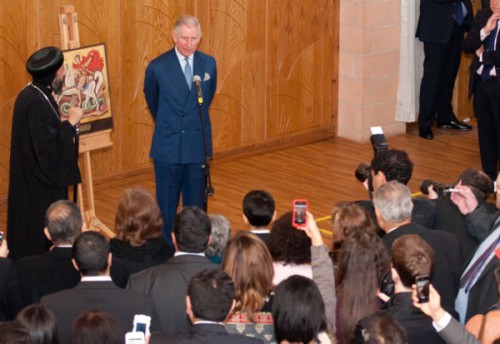14th October 2014
The case for freedom of religion or belief


The question of freedom of religion or belief (FoRB in the international jargon) is a challenging and sensitive one. It is a fundamental right, touching the conscience of the individual, underpinning many other rights. As we focus on the issue of equality on Blog Action Day, we must ensure that FoRB remains at the top of our agenda.
It is all the more important because, globally, even simple tolerance of other religions, let alone religious freedom (or freedom not to have a religion), appears to be at an increasing premium. Recent events in Iraq and Syria, for example, have only highlighted the closing space for Christians and other minority communities in the Middle East and North Africa. In parts of Asia, we see a growing trend in the alignment of nationalist and religious intolerance. These range from claims to exclusivity (e.g. the banning to Christians of the use of the word “Allah” in parts of Malaysia), to discrimination (such as the very uneven application of blasphemy laws in Pakistan), to outright persecution (such as unpunished attacks on members of Muslim minority groups in some areas of Burma or Sri Lanka). In Europe, anti-Semitism appears, again, to be on the rise. An attack on members of one faith is an attack on the freedoms of all, something Muslim, Christian and other faith leaders have been making very clear in recent weeks. Yet, if anything, the situation is getting worse.
Such intolerance contributes to instability, inequality, under-development and forced migration. Which is why it must be the business of states, as well as the business of NGOs, religious leaders and others. For that reason, I shall be dedicating much of this month to the issue.
On 14 October, I am joining Foreign Office Minister Baroness Anelay when she chairs the FCO’s independent Advisory Group on Freedom of Religion and Belief, looking at where the UK might have influence and should be prepared to intervene. I shall also be talking to FCO and Ministry of Defence colleagues about the importance to diplomats of an understanding of the relationship between religion and foreign policy. Later this month, I shall join European and other diplomats in Milan to look at other aspects of this work.
For the Holy See, freedom to worship, to practise your faith, to believe, to educate your children in that belief, are freedoms that must underpin any free, civilised and democratic society. The United Kingdom, recognising that there are no easy fixes, agrees. It would be too simple to look around the world and resign ourselves to the counsels of despair. We cannot allow that to happen.
Thank you Ambassador.
Goes a local saying where I live that when one points a finger, three fingers will point back at one.
The Catholic Church, as an institution, is in no position to point fingers. It infringes religious freedom albeit in a much more subtle way. It doesn’t murder in the name of God, it doesn’t persecute Muslims, and doesn’t make life miserable for Buddhists.
It does it to women. And it does it in a roundabout way. The clergy conditions membership to the Church to acceptance of unequal conditions for women in the religious sphere. In order to belong to the Catholic Church, its members must agree that women are to remain essentially silent and subordinate, as opposed to men who are always conserve the potential to be vocal and active in the Church.
The appointment of a few women to Vatican commissions and congregations solves nothing. Anything those women say or do in the Church is “necessarily” subject to authorisation or validation by a Church hierarch. The same does not apply to men, whose words and deeds are only “circumstantially” subject to such authorisation or validation. Men always conserve the potential to ultimate headship and decision making positions in the Church. Women are denied that potential simply because they are women.
Alternate theologies and ecclesiologies that provide grounds for feminine headship in the Church on par with (not in substitution of) Peter are crassly overlooked.
I thus have no alternative but to suspend and condition my membership to the Catholic Church until correction is made of its traditional and actual human rights violating policies. The Catholic Church has refused, so far, to comply and rectify the human rights violations implicit in its very structure of exclusively masculine authority and necessary feminine subordination.
Membership in the Church while human rights violations are current would make me party to the violation.
As a result, it is impossible for me to belong to the Church for reasons beyond my control and my religious freedom is violated as well.
The Catholic hierarchy has no intention of effecting a change in the near future.
Which is why -I quote-, it must be the business of states, as well as the business of NGOs, religious leaders and others. The Catholic Church must come under the jurisdiction of international institutions charged with the protection of women’s human rights or the influence of those democratic countries with sufficient interest in the welfare of women’s religious freedom.
The UK could be a good start.
15 October 2014
Nigel Baker expresses the urgency of this problem with perfect conviction, and I would add only that ANY application of blasphemy laws ANYWHERE is a needless assault on human freedom. I understand that Baker describes Pakistan’s blasphemy laws as “unevenly applied” because he is using them as an example of discrimination. I would argue further, however, that such laws tend to be unevenly applied by their very nature, since people tend to define blasphemy only in reference to their own particular religion, and it is usually only when one religious group dominates in a nation that there is a majority capable of enforcing a definition in law. When blasphemy laws existed in Britain, they likewise applied only to Christianity.